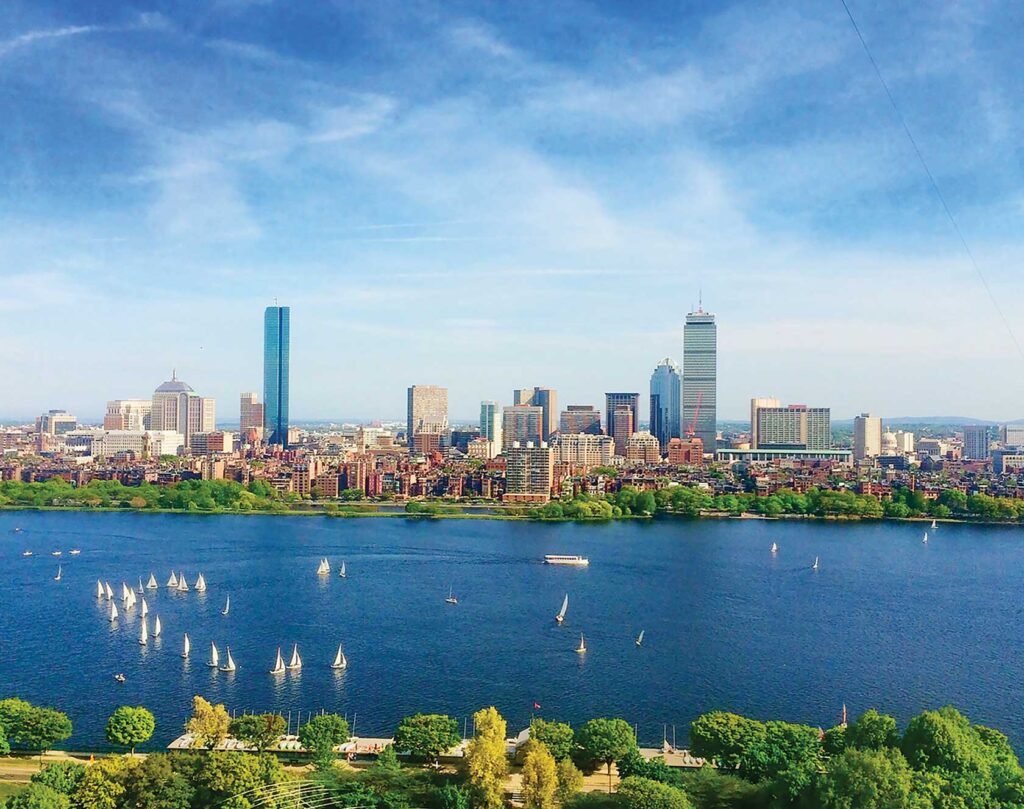
In a survey from The Institute for Quality of Life, based in London, England, Boston was named the second happiest city in the United States.
The index ranks 250 cities globally, categorizing them into golden, silver, and bronze tiers. The top 37, considered some of the happiest locations in the world, includes Minneapolis, Minnesota, as the only U.S. city at spot No. 18. Boston, which holds the 38th spot, leads the silver tier that includes cities ranked 38-100. Lastly, the bronze category includes cities ranked 101-250.
Aarhus, Denmark, achieved the highest score on the list, although the institute wrote in the report that it was “not fair to establish a single-city leader. In terms of U.S. cities, Minneapolis ranked the highest with the 18th spot. Baltimore at No. 57 and Washington D.C. ranked No. 85 were also included on the silver list.
The bronze list featured six U.S. cities: San Francisco at No. 114, Salt Lake City at No. 145, Madison, Wisconsin, at No. 167, Pittsburgh at No. 190, Rochester, New York, at No. 214, and Portland, Oregon, at No. 237.
The annual Happy City Index accounts for five factors: citizens, governance, environment, economy, and mobility. “It is most appropriate to establish a group of cities committed to happiness cultivation and growth, where education, inclusive policies, economy, mobility, environmental protection, access to green areas or innovation are not only important components of the official policies created but are also visible in the implemented solutions,” reads the website.
Boston’s high ranking can be attributed to various factors, including its robust economy, vibrant cultural scene, and extensive green spaces. Mayor Michelle Wu expressed pride in the city’s ranking, emphasizing Boston’s continuous efforts to improve the quality of life for its residents. “Our focus on creating a supportive, inclusive and dynamic environment for everyone in Boston is paying off,” she stated. “We are honored to be recognized as one of the happiest cities in the world.”
The Boston Policy Institute (BPI), which surveyed Boston residents recently, reiterated that Boston residents are content with living in the city. However, growing living costs, a tired public school system, and struggling public transit have been cause for anxiety for many Bostonians.
The average Boston home sells for a median price of $800,000, which is a .6% increase in home prices since May 2023. Housing costs increased by 1.8% from 2021 to 2022 and saw a 2.6% increase between 2019 and 2021. Furthermore, rent prices also continue to rise, making Boston the third most expensive city in the country to rent. 30 – 32% of renters in the Hub are considered cost-burdened in 2022, meaning that they are spending more than 30% of their income on rent.
The survey indicated that many younger residents are keen to stay in Boston, yet they are grappling with the high cost of living and housing in the area.
“People can really love a place and feel like it doesn’t love them back,” said BPI Executive Director Greg Maynard in an interview with WBZ-TV.
Despite significant investments, including Boston Public Schools’ expenditure of around $31,000 per student — the highest in the state — education remains a primary concern among voters.
75% of Boston residents responded with “yes” when asked if they felt the quality of life in Boston was good. “You have the same number of people who are saying they really like Boston as say that there are real issues with cost of living and they don’t think the city’s doing a very good job dealing with them,” Maynard said.
Boston’s cost of living has been steadily increasing over the years, driven by factors such as rising housing prices, increased demand for services and a competitive job market. “Boston may be ranked highly in happiness surveys, but the high cost of living throughout Massachusetts can be a constant burden,” said Sheena Collier, the founder of Boston While Black.
“This city prides itself on its quality of life, but for many residents, especially people of color, that quality of life feels out of reach. These ‘happiest city’ lists often don’t consider the experiences of diverse communities. Recent studies, in fact, show that Massachusetts is the most expensive state to live comfortably in. This economic reality can significantly impact a person’s sense of belonging and well-being.” Collier said of the high cost of living in Boston.
Balancing economic growth with affordability requires sustained policy initiatives and community engagement. “We are committed to ensuring that Boston remains a city where everyone can thrive,” said Mayor Michelle Wu. “This means tackling the cost of housing, improving public transportation, and supporting local businesses to create a more equitable and affordable Boston.”
Boston’s ranking as the second happiest city in the U.S. underscores its many positive attributes as well as highlights the pressing need to address the rising cost of living.






